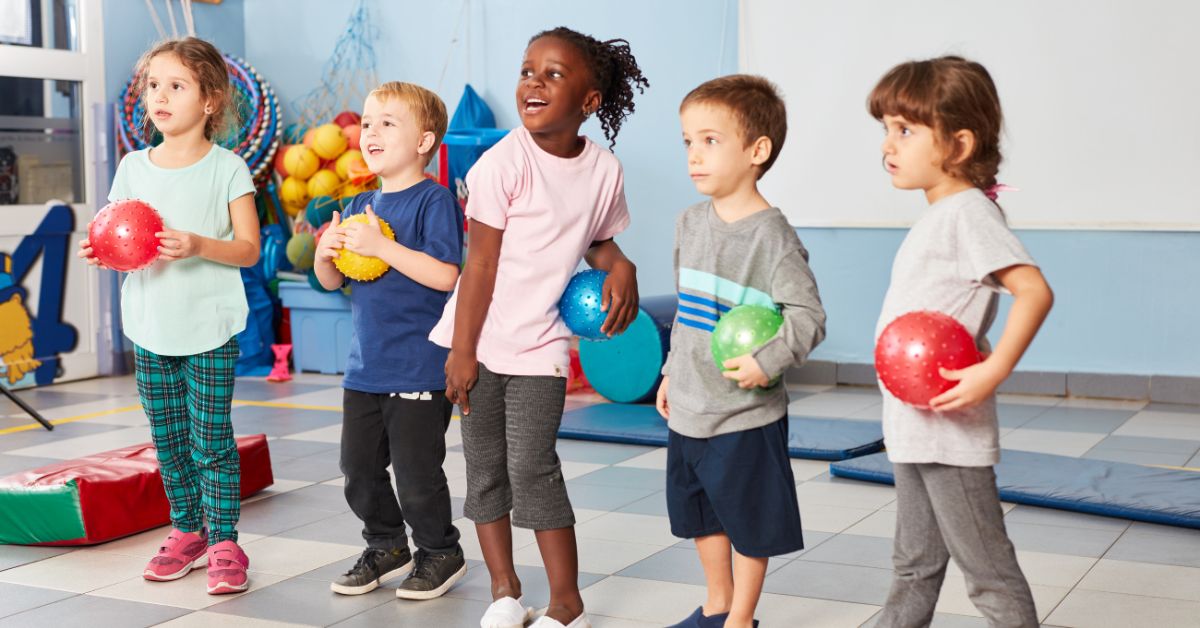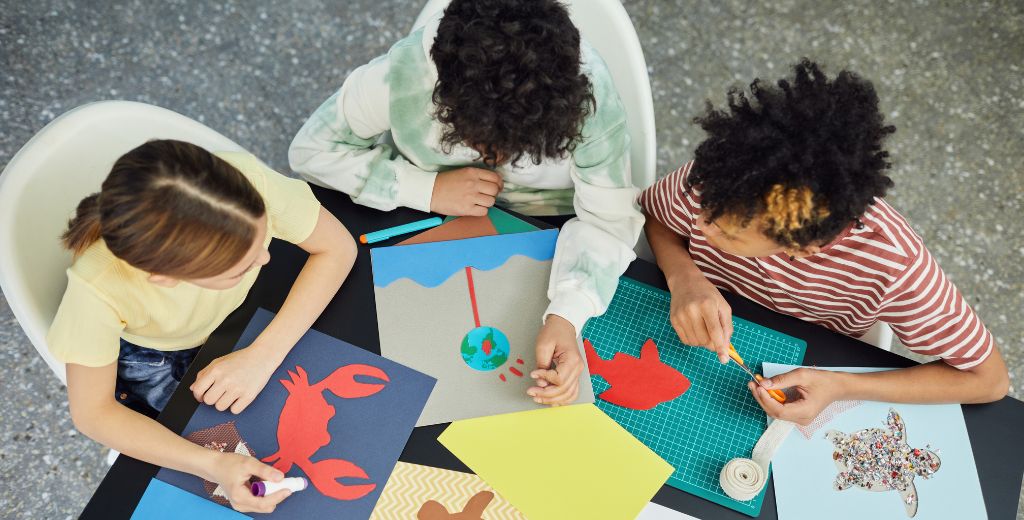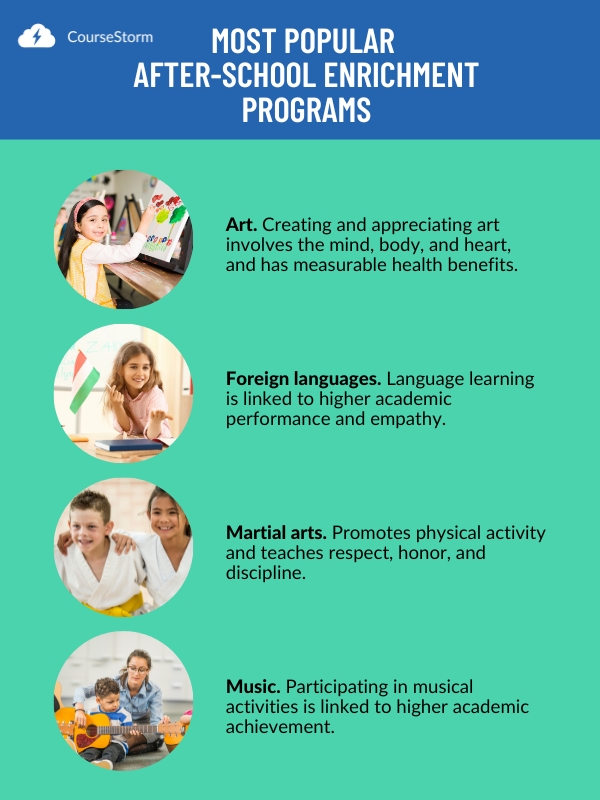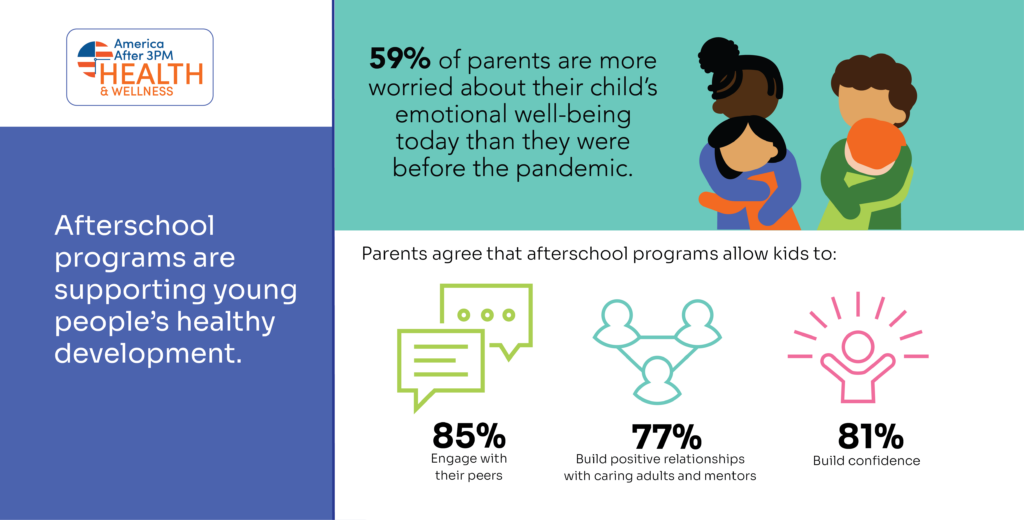Grow Your Program
The Benefits of After-School Enrichment Programs

Students are heading back to school. And that means parents are looking for activities to keep their children busy and engaged after the dismissal bell rings. That may be aftercare or afterschool enrichment programs at school or other enrichment activities in the community.
A national survey of 2,000+ K-8 parents and guardians by the nonprofit organization Learning Heroes found that 65% have children enrolled in after-school activities. The most common reason was “to expose children to new experiences, ideas, and perspectives beyond their everyday home and school lives.” Data also show that demand for afterschool enrichment programs has skyrocketed.
This article can help organizations offering afterschool enrichment programs to understand what parents and students are looking for in after school enrichment activities, showcase the benefits of your program, and attract and enroll more students.
What Are Enrichment Programs?
After-school enrichment programs typically focus on fun, games, play, movement, and other activities students may not get to participate in during the school day.
Afterschool enrichment programs typically offer a variety of activities, letting students explore and discover new interests.
Afterschool enrichment programs often provide a range of activities, letting students explore different options and discover new interests. “Furthermore, because after-school programs are sometimes more diverse than school classrooms, with students of different ages and backgrounds, children can build empathy, communication and teamwork skills,” noted US News & World Report.

In fact, building those “soft skills” that are so important in the workplace and in life is one of the key benefits of enrichment programs for all ages.
There are after-school enrichment programs specifically focused on subjects like coding or the arts, such as TRYPS Children’s Theater in Missouri, which offers an arts-based alternative to other afterschool programs for grades K-5. Students participate in “mini plays” and theater games as well as art projects and field trips.
Most after-school enrichment programs are geared toward elementary-age students. However, there are opportunities for middle school and high school students as well. Activities for these ages tend to take the form of afterschool clubs like chess, robotics, or coding. Some community makerspaces may offer enrichment classes or workshops. For older teens, afterschool workforce development programs are an option. And of course, sports and music are always popular after-school activities.
The Top Afterschool Enrichment Classes for Kids
The Learning Heroes report found that 49% of after-school activities are arts, sports, or interest-based programs, and 18% are academic. As for the most popular after-school enrichment activities, US News puts these at the top of the list:
Art. “Art is fundamental to education as a cross-brain experience that involves mind, body, and heart,” said Karen Pittman, co-founder of the nonprofit Forum for Youth Investment. Read more about the positive impact of the arts on health, as well as how to market art classes for kids to the parents who will register them.
Foreign languages. Research shows that language learning is linked to higher academic achievement and can help develop students’ reading abilities. Learning a second language has other benefits, as well. Bilingual children have been shown to demonstrate empathy better than their peers who only speak one language.
Martial arts. In addition to providing physical activity, the martial arts—such as karate, taekwondo, and judo—also teach respect, honor, and discipline. Children who participate in martial arts have shown increased social skills and confidence along with less aggressiveness. Martial arts classes are also a good option for children interested in athletics but not team sports.
Music. Music is another cross-brain experience, noted Pittman. Many countries incorporate it into early childhood education, but older children may not have the opportunity to engage in music at school. Research has shown that when K-12 students have a chance to participate in musical activities such as playing an instrument or singing in a chorus, they are more likely to stay in school and to perform better in English, math, science, and second languages.

Why Are After-School Programs Important?
Naturally, parents want their children to be safe and supervised after school. There are many benefits to after school programs beyond providing childcare to kids until their parents are done with work, however. In fact, afterschool programs have been shown to improve participants’ performance at school, reduce crime and juvenile delinquency, and provide a significant return on investment through increasing students’ earning potential.
Afterschool programs have been shown to improve school performance, reduce crime, and increase students’ future earning potential.
Data from the Afterschool Alliance, a nonpartisan, nonprofit organization whose mission is to ensure that all children have access to affordable, quality afterschool programs, found the following benefits of afterschool programs:
- Access to caring adults and mentors
- Help children develop social skills and life skills
- Help develop confidence and responsible decision-making
- Reduce the likelihood of children engaging in risky behaviors
- Provide opportunities for physical activity
These findings are more important than ever, given that loneliness and youth mental health issues skyrocketed during the pandemic.

Source: AfterschoolAlliance.org
What Do Parents Look for in Afterschool Enrichment Programs?
To market after-school programs in your community, you first need to understand what’s important to parents and caregivers who will be looking for, evaluating, and ultimately registering their children for afterschool activities.
Transportation may be an issue for many parents if an enrichment program is not at their child’s school, so if your program does or does not include transportation, be sure to note that in your marketing materials and program descriptions.
It’s also a good idea to note whether a snack is included, and if students are given time to complete homework. For some parents, having a place where students can work on assignments and get help if needed is a huge benefit that avoids evening homework battles.
Some community organizations like the Y offer before and after school enrichment programs that start as early as 7 a.m. and are available to students 5 days a week or only 2 or 3 days a week. Perhaps with flexible scheduling, your program could fill a need for parents that other programs don’t.
Demand has skyrocketed: for every child in an afterschool program, three are waiting to get in.
Unmet demand for after-school enrichment programs has skyrocketed. For every child in an afterschool program, three are waiting to get in, according to the Afterschool Alliance. With the right marketing and a simple, parent-friendly registration tool, your afterschool program can be the solution families are looking for.
CourseStorm serves many customers offering after-school activities and enrichment classes. Features like group registration and emailed waiting list invites make for a simple and seamless experience for both families and your program staff. Get in touch with us today for a demo!

Abigail Green
Abby has overseen content development for higher education degree programs related to education, technology, business, and healthcare. One of her first jobs after college was working with children’s programs for the Walters Art Museum in Baltimore, Maryland. She is an experienced and versatile writer and editor whose work has been published by Johns Hopkins, the University of Baltimore Alumni Magazine, and The Chicago Tribune.
